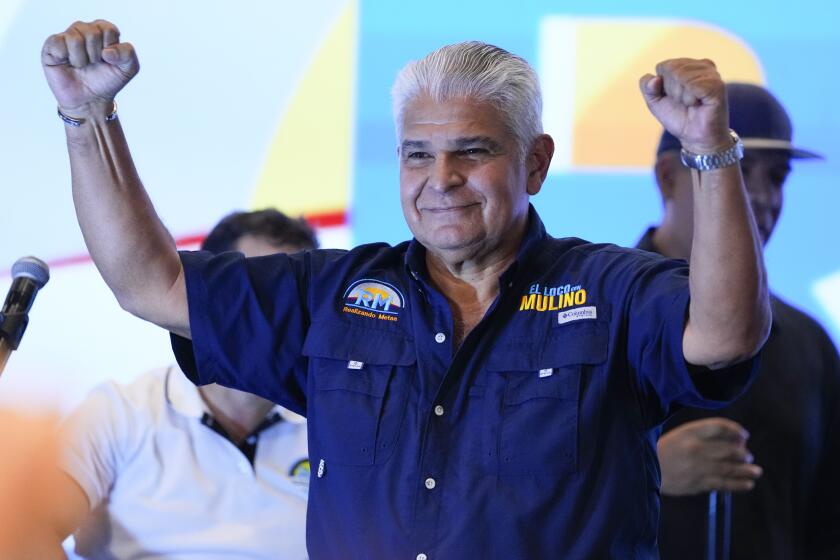Something’s Fishy About the Baghdad ‘Defection’ : Iraq: Is Saddam Hussein really threatened, or is this a clever ploy to strengthen his regime?
Whatever the Western media and hopeful diplomats may wish to read into the flight of Lt. Gen. Hussein Kamel Majid from Iraq, their reading of “defection” is only one of many equally plausible readings. Moreover, the excitement over Kamel has taken attention from the true opposition within Iraq: the Kurds and Shiites.
The rush to embrace the standard reading of Kamel’s “defection” as an indicator that the regime is cracking under international pressure is more representative of wishful thinking than serious analysis.
It is possible that President Saddam Hussein’s situation is dire, and that Kamel, until recently the trusted head of military industry programs, wanted a safe harbor from which to hasten the regime’s collapse. This is the scenario favored by Western commentators. But there is an opposite scenario that close students of Iraq find persuasive: that Kamel’s defection is a ruse, an elaborate plot by Hussein to get the devastating U.N. sanctions lifted and thus preserve his regime.
Consider the most prevalent reading of Kamel’s defection: that he was driven out because of his differences with Hussein’s son Uday, who is being groomed as his father’s successor. One problem with this scenario is that Hussein sent Uday to Jordan to persuade Kamel to return, hardly a likely emissary if he were a prime reason for Kamel’s defection.
Furthermore, this scenario fails to take into account the tribal nature of the Iraqi regime and the differing concept of family in Western and Arab cultures. First, it is misinformed to portray the Iraqi regime as the dictatorship of Saddam Hussein alone, rather than of his clan. Since coming to power, he has worked diligently to concentrate power in the hands of his family from the town of Tikrit. Kamel is very much a part of this ruling clan; all of his kin are from Tikrit and would be certain to suffer reprisals if the defection were genuine. The Western media reported that Kamel brought his family--that is, his wife and children--with him to Jordan; in Arab terms, he left his family--his parents, brothers and cousins--behind as potential hostages. It is extremely difficult to imagine that Kamel would sacrifice his blood relatives for an uncertain outcome such as the overthrow of Hussein from Jordan. In such an Arab context where blood relations are everything, it even more difficult to imagine Kamel’s wife and her sister abandoning their father, Saddam Hussein.
As for the role of Jordan’s King Hussein in this affair, he is most probably more than a bystander. Consider his statement to the Israeli newspaper Yediot Aharonot, that Kamel discussed with him his plan for defection during a visit to Jordan last month. This gives rise to the theory that the king encouraged the defection to improve his own situation, for it wins him favor with Washington while improving his relations with the Gulf states, especially Saudi Arabia. It is worth noting that last year, King Fahd of Saudi Arabia refused to receive King Hussein, even as a pilgrim to Mecca. Since the defection, emissaries of the two kings have exchanged visits.
This brings us to the alternative, and perhaps most plausible interpretation of the defection of Kamel and his brother, who is also a son-in-law of Hussein and his former chief of security: that it is a tactic designed to preserve the regime, not to overthrow it. For one thing, it allows Hussein a face-saving opportunity to give the United Nations the information required for the lifting of sanctions. This would explain Deputy Prime Minister Tarik Aziz’s prompt invitation to U.N. inspectors to come and collect the new information that Iraq is willing to give about its weapons program. Aziz could claim to domestic critics that he revealed the information not because Iraq knuckled under, but because of the treachery of Kamel, who gave the state secrets away.
Thus Kamel’s defection becomes a staged one, another attempt by a sly regime to survive by recasting itself. By fracturing within itself, it captures both those loyal to the state and those in the opposition. The insiders rally around Hussein and the outsiders around Kamel.
This would not be the first time Hussein has staged such a ruse. In 1989, when his son Uday shot one of the presidential guards for arranging a liaison between Hussein and his current wife (a move that pushed Uday’s mother backstage) Hussein ordered his son to be executed. But under the pressure of Iraqi public opinion and petitions from other Arab governments, Uday was pardoned in a great show of paternal magnanimity.
Is Kamel’s defection another such ruse? Will he be forgiven if it works? This possibility might explain the shuttle diplomacy of family members--including Uday’s mother--to Jordan. These visits could be seen as simply communications concerning the next stage of the game rather than as attempts at reconciliation.
Whatever scenario is correct, the American response is ill-conceived. For one thing, it would legitimize a war criminal, for it was Kamel who brutally put down the Shiite uprising of 1992. If Washington wants the ouster of the current Baghdad regime, it should help the Kurds and the Shiites. Instead of permitting the Turkish invasion of Kurdish Iraq and the continued suppression of the Shiites, the United States should lift the embargo in these regions, leaving only the Baghdad area under sanctions. If the Shiites and the Kurds were free to organize their own opposition, they could undermine or at least check Saddam’s power.
More to Read
Start your day right
Sign up for Essential California for news, features and recommendations from the L.A. Times and beyond in your inbox six days a week.
You may occasionally receive promotional content from the Los Angeles Times.






